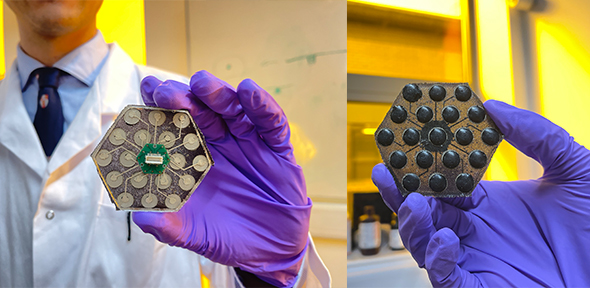
Dr Amparo Güemes and PhD student Ruben Ruiz-Mateos Serrano have been awarded a fellowship and scholarship respectively by the Worshipful Company of Scientific Instrument Makers (WCSIM).
The WCSIM’s mission to advance science and engineering for the benefit of society and humanity resonates strongly with me – it is the reason I became a biomedical engineer and chose to pursue research.
Ruben Ruiz-Mateos Serrano
The WCSIM is a charitable community of scientists, engineers and students. The livery company regularly awards grants and scholarships to selected students to support them with their studies.
Beloe Fellowship
The Beloe Fellowship for 2025/26 has been awarded to Dr Güemes, Royal Academy of Engineering and Rosetrees Research Fellow at the Bioelectronics Laboratory. Dr Güemes receives £5,000 towards her postdoctoral research focusing on the development of novel physiological sensors and bioelectronic systems for neural and metabolic interfacing.
These technologies are designed to decode and modulate complex biological signals in real time, with particular relevance to chronic conditions such as diabetes and epilepsy.
“Recent advances in bioelectronic medicine have revealed the nervous system's critical role in regulating peripheral metabolism, particularly glucose homeostasis (blood sugar regulation),” said Dr Güemes. “However, our ability to study these interactions – especially in dynamic, physiologically relevant contexts – remains limited.”
Dr Güemes’ work addresses this challenge by engineering next-generation sensing technologies and analytical frameworks that capture and interpret neural and metabolic activity with high temporal and spatial resolution.
By combining organic bioelectronics, signal processing and systems engineering, this work aims to lay the foundation for closed-loop therapies that adapt dynamically to the patient’s physiological state. The long-term impact lies in enabling a shift toward personalised, technology-driven healthcare solutions that can support early detection, continuous monitoring and precise intervention.
“This fellowship is both a recognition of my work and an exceptional opportunity to shape the future of translational, multidisciplinary research,” said Dr Güemes. “It allows me to deepen my exploration of the connection between the nervous and metabolic systems, enabling the development of innovative technologies that could revolutionise the way we diagnose and treat complex, chronic conditions.”
She added: “The guidance and support offered through this fellowship will be instrumental as I grow as a leader, refine my research vision, and contribute meaningfully to both the scientific and clinical communities. I am incredibly grateful for this opportunity and excited for what lies ahead.”
Dr Güemes’ long-term vision is to establish a world-class research lab that becomes a leader in the field of neurotechnology for metabolic control.
“Over the next decade, I aim to drive innovation in both basic and applied research, developing technologies that not only improve the management of chronic diseases but also expand into new areas of healthcare where the nervous system and metabolism are intertwined.
“I hope to see these innovations transition into clinical settings, helping to shape the future of precision medicine. Additionally, I am committed to building an inclusive and interdisciplinary team, fostering an environment where cutting-edge science can thrive, and the next generation of researchers can be trained and mentored.”

A close-up of the top and bottom (right) of Ruben’s novel wearable e-textile technology for the early detection of valvular heart diseases. Credit: Chaoqun Dong.
SIM Postgraduate Scholarship
A SIM Postgraduate Scholarship has been awarded to Ruben Ruiz-Mateos Serrano, Centre for Doctoral Training in Connected Electronic and Photonic Systems (CEPS) MRes+PhD student. Ruben receives £2,000 for his outstanding research on scientific instrumentation development.
Ruben’s translational research initiative focuses on developing and validating a novel wearable electronic textile (e-textile) technology for the early detection of valvular heart diseases (VHDs). The research integrates materials science, biomedical engineering and veterinary and clinical medicine to create a high-resolution, non-invasive cardiac monitoring system.
Central to the project is the use of high-density conducting polymer electrodes embedded into soft, flexible fabrics. These electrodes enable the capture of detailed spatiotemporal cardiac signals, offering a significant improvement over conventional electrocardiogram (ECG) in terms of signal quality and wearability.
“My research aims to address the limitations of current diagnostic methods such as echocardiography, which are costly and inaccessible in many primary and veterinary care settings. The project includes iterative prototype development, pre-clinical evaluation and real-world pilot testing in dogs at The Queen’s Veterinary School Hospital in Cambridge.
“Key research objectives include assessing signal fidelity, user comfort, long-term wearability and the feasibility of machine learning for disease detection.”
Ruben added that future research will focus on wireless integration, data analysis algorithms and expanded trials in both animal and human cohorts. The project will seek to establish a new standard in affordable, scalable and accessible high-density electrophysiology diagnostics, with wider applications in cardiovascular, neurological and rehabilitative health monitoring.
“This scholarship means a great deal to me, as it is my first funding application,” said Ruben. “It is incredibly reassuring to see that my research has attracted the attention of leading researchers, industry figures and entrepreneurs in the UK.”
He added: “Belonging to the WCSIM is especially meaningful, as it is committed to advancing science and engineering for the benefit of society and humanity. This mission resonates strongly with me – it is the reason I became a biomedical engineer and chose to pursue research.”
Ruben will complete his PhD in October 2025. The e-textile technology he has developed was submitted for patenting through Cambridge Enterprise last year and he is keen to commercialise it through a spin-out.
“I have been accepted into a couple of start-up accelerator programmes that will run before October, and I am currently exploring various funding sources to continue developing the project,” he said. “I am also applying for postdoctoral positions in the US in case I decide to pursue an academic career.”

